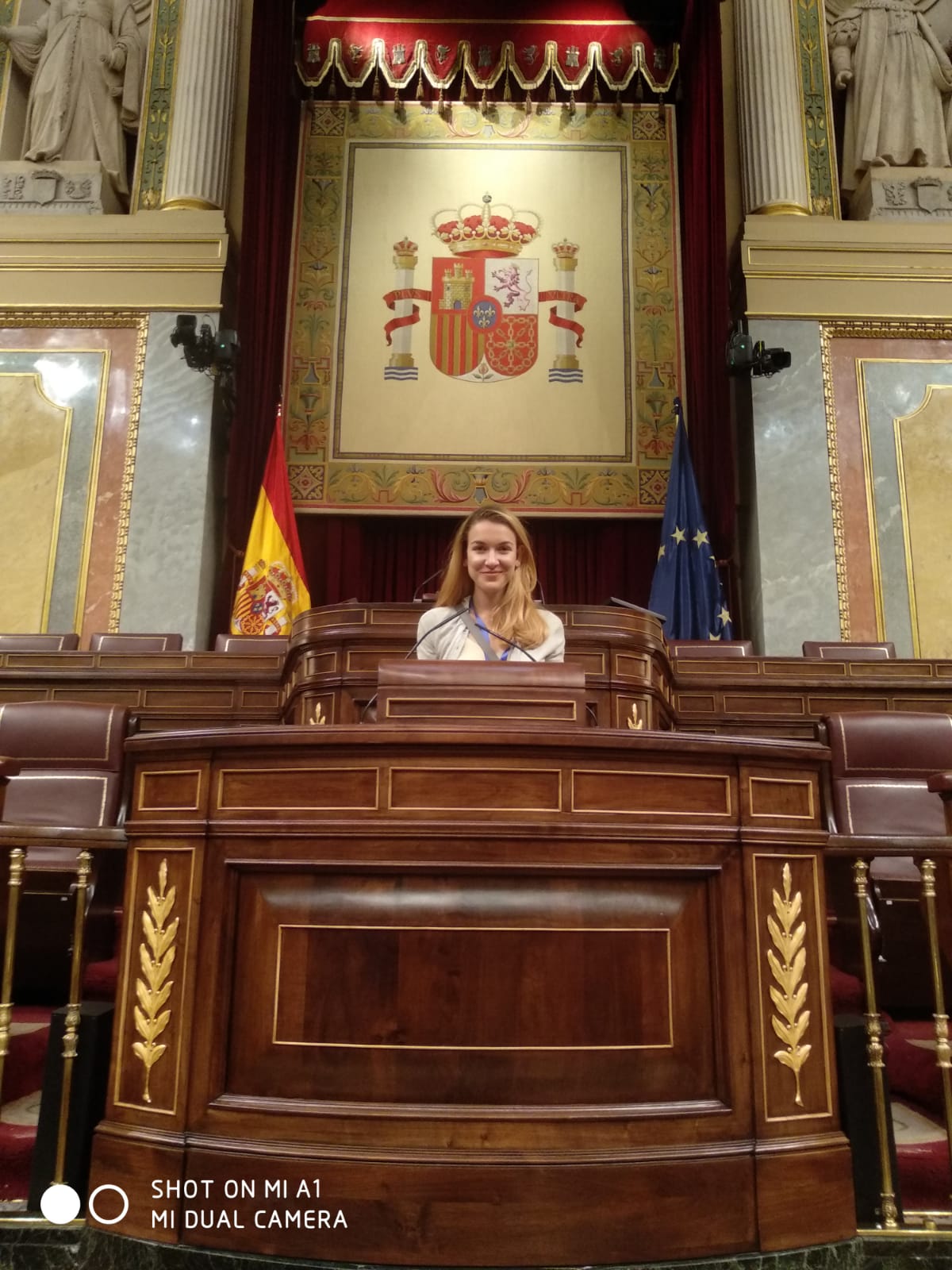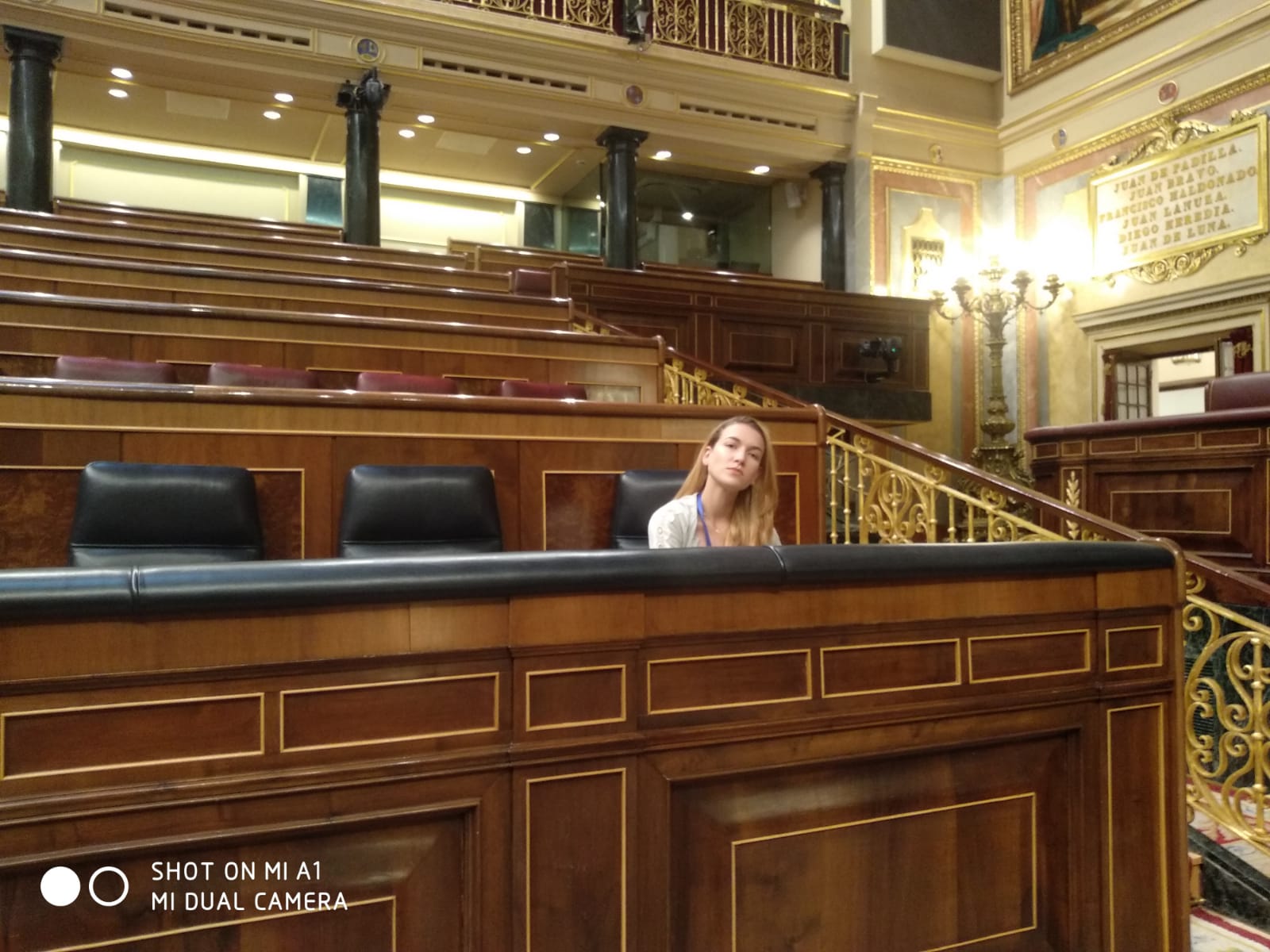My Jaw Dropping Day Reliving Spanish History And The Transition To Democracy
A few days ago I got a text from Rafa, a close family friend, asking if I wanted to go on a tour of the Congreso de los Diputados. Rafa and his family are like my surrogate family here in Madrid and they always look after me and include me in family outings. I of course I accepted, not thinking much of it. It wasn’t until I arrived that I realized what I had signed up for. We had been invited on a private tour of the Spanish government and parliament house! These buildings are only opened to the public once a year, and here we were getting our own tour! If you know me you know how excited this made me. This is the kind of thing that really gets me going.
The Parliament consists of the Palacio de las Cortes, which was built in 1843 and several other buildings were added in recent time. We started in the modern buildings where our guide walked us through the meeting halls and communications offices.
When we got to the press briefing room, of course I stood up on the stage pretended to give a press conference!
But all this paled in comparison to when we made it over to the Palacio. Our guide told us to close our eyes while she ushered us through some doors and up some steps. When we opened our eyes we looked out at this……
My jaw dropped. I was completely speechless. I immediately had flashbacks to the infamous video of the failed coup attempt in 1981. This was the exact room where, on February 23, 1981, 200 Civil Guard Officers led by Neo-Francoist military leaders stormed the Congress in an attempt to dismantle Spain’s fragile, young democracy. The story of Spain’s transition to democracy is fascinating. Anyone interested in political science, democracy building, and stories of monarchy, I strongly recommend you dig deeper (I have included lots of links for further reading and below adding a list of other recommendations). But in a nutshell, the 1930s were a traumatic and brutal time in Spanish history that saw the abolition of the monarchy and the plunge into civil war. In 1939, Francisco Franco emerged the victor and established a military dictatorship in Spain the would last nearly 4 decades. During this time Franco took the son of the would be King (who was living in exile) under his wing, bringing him to Spain and tutoring him to be his future successor. The plan was that after his death, the monarchy would be reestablished and the young Prince Juan Carlos would continue Franco’s legacy. All was going according to plan. Franco died in 1975, famously saying he had left everything “attado y bien attado” (meaning well tied, with no loose ends), Juan Carlos takes the throne as King of Spain, but then, in one of the most stunning political plot twists of the 21st century, Juan Carlos announces his country that he is a democrat and Spain would become a democracy. The transition was a long, delicate and arduous process. It was filled with brilliant political maneuvers, dirty corruption and even top secret meetings between communist spies and royal agents that sound straight out of the pages of a historical drama novel. Eventually, the democratic transition was successful, but of course, there was a group of nostalgic leaders in the government who missed the “good old days” and yearned for the power dictatorship afforded them (and only them, naturally). This takes us back to this room that I was standing in and the 1981 coup. The military officers stormed the room, armed with weapons, when the parliamentary leaders were in the middle of a vote and ordered everyone to lay down on the floor. After 18 long hours and yet another brilliant display of political deftness by King Juan Carlos, the coup was deemed a failure and the rebels were arrested. The irony of this whole scandal is how it strengthened the Spanish people’s commitment to democracy and their faith in the Monarchy.
Possibly considering a career change…. ?
You can still see the bullets on the ceiling from when the shots were fired during the failed coup.
So, as a Spaniard who is also a political buff, this day was monumental for me. There’s no feeling like being in a room that is so filled with history, where decisions have been made that changed the course of societies, nations, even the world. Leaders pass, institutions change and societies evolve, but buildings, art, books, these physical things last and it’s so important to cherish, protect and preserve them. These are the places where human knowledge, our achievements and our failures are contained. If only these walls could talk…..
Sitting in the exact same seat where Adolfo Suarez refused to obey the orders of the rebels and stayed firmly in his seat.
An extra special surprise! We bumped into Adolfo Suarez’s son (also named Adolfo) in the hallway and he invited us into his office! I was speechless!
Recommendations for further discovery:
El Rey: This book is a compilation of conversations between King Juan Carlos and royal biographer and friend Jose Luis de Vilallonga. I love it because it’s a first hand account of his entire life and sharing of personal memories that you could only get from him.
De La Ley A La Ley: If movies are more your thing, I recommend this one. It’s a detailed account of the transition to democracy and highlights the role of the lesser known but key architect of Spanish democracy, Torcuato Fernández-Miranda. A brilliant attorney, he dismantled the dictatorial system by going “de la ley a la ley” (from law to law, one by one) to lay the foundation for a democratic constitution.
Adolfo Suarez, The Man Who Came After Franco: I love New Yorker profiles. Here is one on Adolfo Suarez, Spain’s first democratically elected Prime Minister






